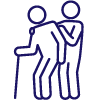- 요코하마시 톱 페이지
- 나카구 톱페이지
- 여러 단어 (Multilingual)
- English
- Public Relations Magazines
- Koho Yokohama Naka Ward Version(~2023)
- 2022
- April ①Join a neighborhood association! ② Learn about the birth of Naka Ward!
여기에서 본문입니다.
April ①Join a neighborhood association! ② Learn about the birth of Naka Ward!
This is an abridged version of “Koho Yokohama Naka-ku Ban,” Naka Ward Office’s public relations magazine. (Click here for the multilingual website of “Koho Yokohama City Edition”)
Last updated date:2024/10/4
▶▶ Events
① Join a neighborhood association!

Do you know what a neighborhood association is?
For those who are not familiar with neighborhood associations or do not know what kinds of activities they do, we asked some neighborhood association chairpersons to answer some frequently asked questions.
◀Neighborhood association chairpersons

Q1. I just moved here and don’t know much about the area yet.
A1. Joining a neighborhood association makes it easier to receive information from the local authorities and notices about the community. It would be great if you could establish a good relationship with your neighbors by getting to know them through community cleanup activities and other initiatives spearheaded by neighborhood associations. Once you get to know the people around you, you can turn to them if you want to talk about any problems or find out about things happening in the community.
Q2. I am raising a child. Are there any events that my child can attend?
A2. Neighborhood associations hold a variety of events, such as summer festivals and sports days, which provide opportunities for children and guardians to get to know each other. Please feel free to get involved!
Q3. I am worried about disasters such as earthquakes and typhoons.
A3. Neighborhood associations maintain stockpiles and conduct disaster drills in preparation for disasters. By participating in disaster drills on a regular basis, you will be able to act calmly in the event of an emergency. Recently, some communities are also considering measures for pets should a disaster strike.
Q4. I would like to do something for the community.
A4. Even if you are unable to participate in activities because of your work schedule, we would appreciate it if you could help us in any way you can, such as by assisting at events or giving advice on how to use a computer. Some communities regularly patrol the streets and watch over children on their way to and from school, so we need your help!
Main activities of neighborhood associations

Preparing for disasters
In order to be ready for times of emergency, neighborhood associations cooperate with the local authorities to prepare for disasters by conducting regular drills at evacuation shelters (evacuation sites) and managing emergency stockpiles.

A familiar place for socializing
Neighborhood associations hold festivals, club activities, and other recreational activities to create opportunities for people in the community to spend time and socialize.
Parenting support and watching out for senior citizens
Neighborhood associations hold parenting salons and dinner parties for senior citizens living alone, and work with the entire community to support those raising children, promote health, and watch out for senior citizens.

Community beautification activities
Neighborhood associations work to create a clean and livable community through maintenance of garbage collection points, cleanup activities, community collection of recyclables, and other efforts.

Crime prevention and traffic safety activities
Neighborhood associations work to create a safe and secure community through crime prevention patrols around town and by watching over children on their way to and from school.
Learn more about neighborhood associations
Please feel free to contact us for more information on how to join a neighborhood association or anything else you would like to know.
[Inquiries] Chiiki Katsudō-tantō (Community Activities Subdivision),
Naka Ward Office Tel: 045-224-8132 Fax: 045-224-8215
② Learn about the birth of Naka Ward!
[Inquiries] Kikaku Chōsei-gakari (Planning and Adjustment Section),
Naka Ward Office Tel: 045-224-8127 Fax: 045-224-8214
Naka Ward was among the first places in Japan to adopt Western culture after the opening of the Port of Yokohama, and has developed as the economic and administrative center of Yokohama.
We invite you to take a stroll around town and learn more about the history of Naka Ward, discovering what makes our beloved community so special.
Naka Ward at the time of its birth
Yokohama’s ward system was established on October 1, 1927, creating five wards: Naka Ward, Tsurumi Ward, Kanagawa Ward, Hodogaya Ward, and Isogo Ward.

◀Comparison of area with that time
매립 구역:Landfill area
당시 나카구:Naka Ward at that time
현재의 나카구:Current Naka Ward
The population of Naka Ward was 284,146, or 53.7% of the city’s population at the time. According to 1934 statistics, 95% of the city’s non-Japanese residents lived in Naka Ward, and about half of the households in Yamashita-cho and Yamate-cho were non-Japanese households.
We invite you to take a stroll around town and learn more about the history of Naka Ward, discovering what makes our beloved community so special.

Catholic Diocese of Yokohama, Annex MAP(A)

This building is characterized by its large gable roof and dormer windows. It is one of Yokohama’s “seiyokan,” or Western-style residences, built based on one of the plans brought back from the U.S. by Ichitaro Yamada, a businessman born in Motomachi. It was mainly used as a house to let for foreign residents.
⇒ Catholic Diocese of Yokohama, Annex (Japanese)
Bluff No. 234 Residence MAP(B)
Built after the Great Kanto Earthquake, this is one of the few remaining Western-style residences in Yokohama, built as communal housing for foreign residents.
⇒ Bluff No. 234 Residence (외부 사이트)
Yokohama Local Meteorological Observatory MAP(C)

This is the third oldest meteorological office building currently in operation in Japan. The building features tuff stone walls called bluff masonry and Art Deco style decorations around part of the entrance.
⇒ Yokohama Local Meteorological Observatory (외부 사이트) (Japanese)

▶bluff masonry

▶Art Deco style decorations
Yato Bridge MAP(D)

Built as part of the reconstruction plan after the Great Kanto Earthquake, this bridge is also important in the history of urban development in Yokohama. The main pillar, with its Art Deco style design, is a familiar symbol of the area.
⇒ Yato Bridge (Japanese)

▶main pillar
▶Art Deco style design
Hotel New Grand Main Building MAP(E)

A classic hotel symbolizing Yokohama, it is an architectural structure of high political and cultural significance. Since its opening, prominent people from around the world have stayed at the hotel, such as General Douglas MacArthur and Charlie Chaplin, as well as novelist Jiro Osaragi, who is associated with Yokohama.
⇒ Hotel New Grand Main Building (외부 사이트) (Japanese)
페이지 ID:261-042-193












